You’re on the road and your RV refrigerator suddenly stops working. This can be a nightmare, especially for new RV owners.
Whatever the specific cause might be, the end result is the same. You risk losing your perishables without refrigeration. No one wants a fridge full of warm food and drinks. Fortunately, troubleshooting and repairing your camper refrigerator is less difficult than you might think.
Before you rush to bring in an expert, you can try some simple RV refrigerator repairs yourself. I will cover a range of common problems with RV fridges, as well as techniques to solve them. Some of the common malfunctions happen even in new RVs, so don’t despair.
I’ll make sure you know when it’s safer to let a professional handle it. You’ll also learn how to tell if you need to replace your RV fridge.
Also remember: if the fridge is still within warranty, and it malfunctions without any abuse, you can take it for repair with the seller or the authorized service. This might prove cheaper than trying to fix it yourself.
How Does My Camper Refrigerator Work?
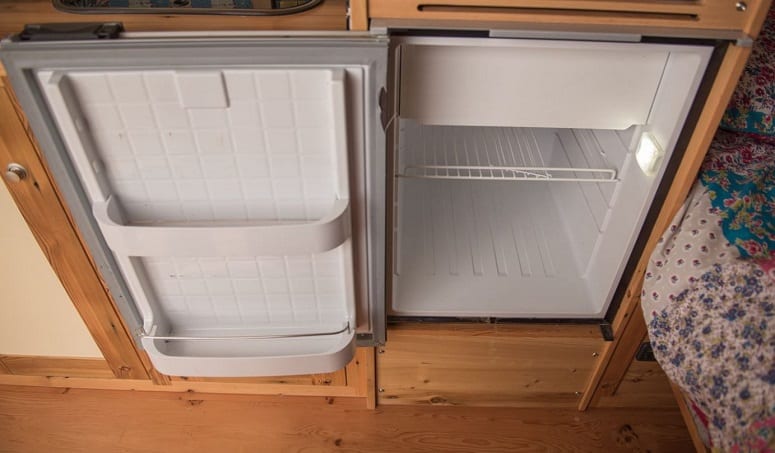
Understanding how your camper or motorhome refrigerator works can help you when it’s time to fix it.
If you’re in the dark about the inner workings of your fridge, don’t skip this section.
To begin with, an RV refrigerator is not like the one you have at home.
You can choose different sizes and builds, but that’s about all they share in common.
Residential fridges are larger, but they aren’t built to withstand the rigors of the road. There are two broad categories of refrigerator used in RVs. The fridge inside is either a two-way or a three-way.
These terms refer to the energy sources that run your fridge: propane, AC power, and/or DC power.
Most RVs have two-way fridges, which use propane and AC power. Three-way refrigerators use DC power in addition to these.
DC power means electricity runs in one direction, rather than reversing the current. With AC power, the electricity constantly reverses direction.
Now you know how your RV refrigerator stays on. Do you know how it works to keep everything cool?
RV refrigerators don’t use freon and a compressor to stay frosty. Most use a mixture of hydrogen gas, ammonia, and water. When these compounds heat up inside the evaporator, they go through a process of evaporation and condensation. It is this process that allows your fridge to stay cool.
Note that it is possible to put a residential fridge in your camper. Even though some people prefer this, it doesn’t mean it’s always a good idea. Watch this video to learn more about why:
Before You Start Troubleshooting And Repairing
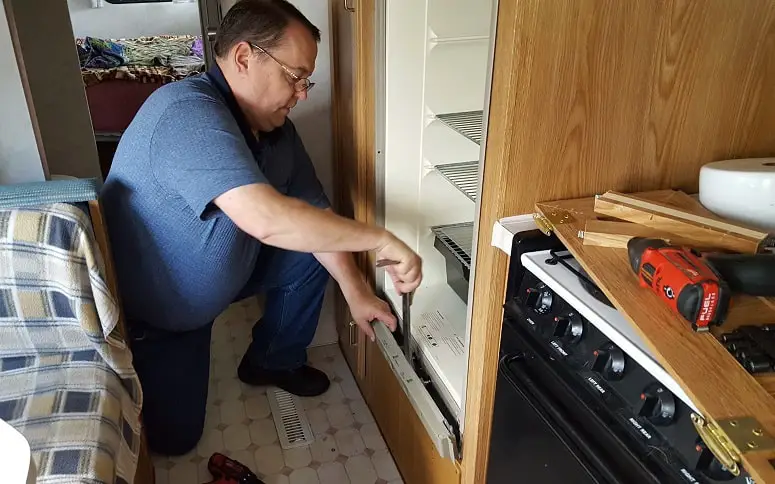
Before you start any repair work, there are a few things to check.
You should start with the simplest fixes before moving on to the trickier ones. You also want to see how bad the problem is.
Staying Level
It may seem like a waste of time, but make sure your RV is level. Having it misaligned could be the reason why your refrigerator isn’t working.
Think about the fridge you have at home. Your kitchen is a flat, stable environment. Unless your kitchen floor is warped, there’s no risk of your fridge getting stuck at an angle.
In an RV, it’s up to you to make sure things are level. If the vehicle is at even a slight angle, your fridge will be too. This increases the chances of ammonia collecting where it shouldn’t.
Your RV refrigerator may not work under these circumstances. I recommend that you invest in a level in order to test this accurately.
Pinpoint The Problem
Run your refrigerator in all available operating modes. For those of you with three-way fridges, this also includes DC power.
If your fridge works on one type of power but not another, this means that your cooling unit is functional. This is good news, as a fried unit might mean a new fridge is in order.
Troubleshooting A Camper Refrigerator: Electrical Issues
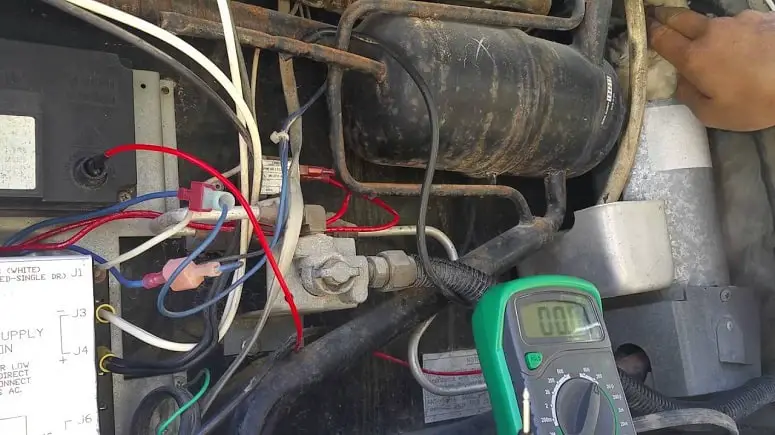
If your fridge runs just fine on propane but not electricity, you have electrical issues.
NOTE: If you are uncomfortable handling your camper’s electrical system, call a professional.
Step 1
Find the manufacturer’s manual for your refrigerator. If you don’t have it, you might be able to find one on the company’s website. This will be a big help to you during the repair.
Step 2
Begin by checking the 120-volt AC current. Take a look at the fuses and circuit breakers at the back of your refrigerator.
It might be a question of just tripping a switch. If you notice any visibly damaged wires, do not touch them. Unless you’re an electrician I advise you to call an expert.
Step 3
If the fuses and circuit breakers are all in order, check your refrigerator’s outlet. Try plugging in another electronic device to see if it works.
You can also buy a multimeter, it will give you an accurate reading of resistance, voltage, and current.
Step 4
If you have a three-way fridge, test the 12-volt DC current too. You can use either a multimeter or a 12-volt circuit tester.
Step 5
If everything is working correctly, the heating element might be at fault. Depending on your fridge, this is powered by either 120-volt AC or 12-volt DC.
Note that this voltage is dangerous if touched without protective gloves. It’s better to call in an electrician to examine it for you.
Troubleshooting A Camper Refrigerator: Propane Issues
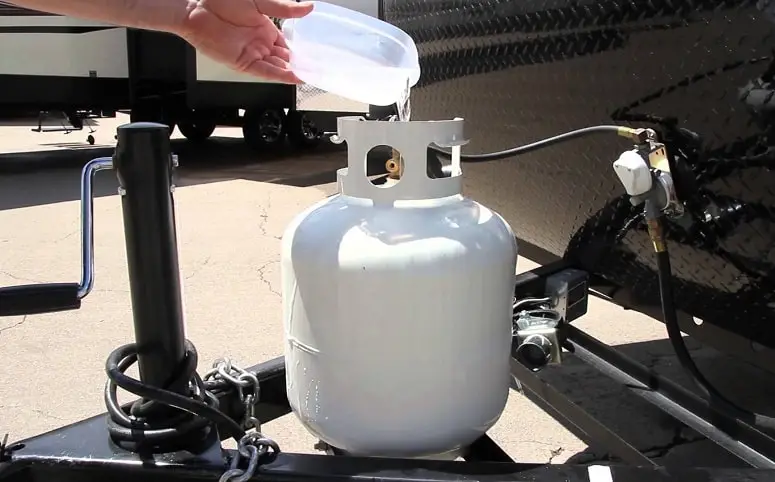
If your refrigerator runs just fine on electricity but not otherwise, it’s time to investigate all propane-related systems.
Step 1
Start by checking the essentials. Make sure you’re not running low on fuel.
Test the valves to see if they haven’t accidentally been shut off.
Don’t forget your LP alarms, if you have them. In some campers, this kind of cooling won’t work if these devices aren’t connected.
Step 2
Investigate if the refrigerator’s thermocouple is working. This device is responsible for detecting heat and controlling your gas valve.
If you see that the burner (also known as pilot light) catches but doesn’t stay lit, replace the thermocouple.
Here is a video about replacing the thermocouple in a three-way fridge:
If you prefer, you can always have a professional do this.
If you prefer, you can always have a professional do this.
Step 3
If your burner won’t light at all, try cleaning it out. Debris might be blocking and stopping it from catching.
Take out the metal shielding and get your vacuum out. It’s preferable to use a shop vacuum, but you can also use a regular one. As long as the attachment is slim, it should clear everything out.
To go the extra mile, get a thin wire and gently clean the burner orifice. Your flame should be back to burning steadily.
How To Fix A Camper Refrigerator With Ammonia Sediment
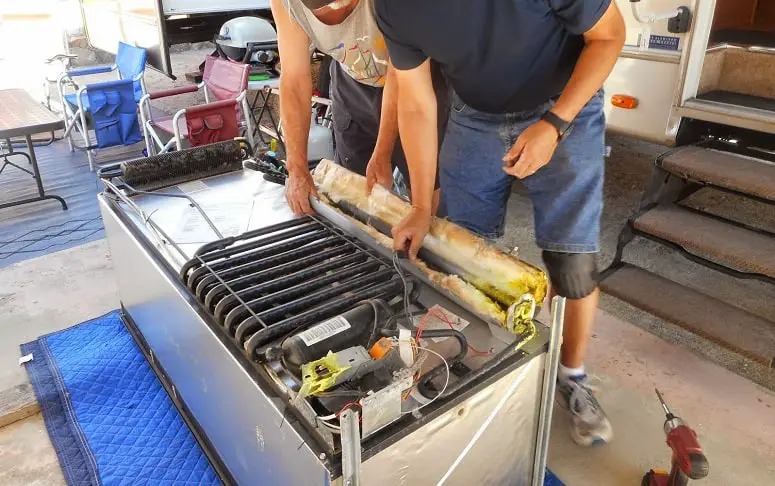
What if your propane and electricity are fine, but your fridge still isn’t staying cold?
If you have an older refrigerator, ammonia sediment might be the culprit.
The same could be the case with RVs that have been left in storage for long periods of time. Ammonia sediment happens when ammonia leaks into the refrigerator itself.
Usually, it will drip all the way into the cooling unit. Since ammonia is a toxic chemical, this is bad news.
One of the signs of ammonia sediment is a fridge that gets warmer over time. The build-up of ammonia stops regular circulation, like a clog.
If ammonia can’t circulate around your fridge, there’s no way it can keep cool. Ammonia sediment is often a terminal condition. The best solution is to start shopping for a new refrigerator.
Flipping Your Fridge
You may have heard that turning your refrigerator upside down will fix ammonia sediment.
There’s no guarantee that this will work, but it definitely doesn’t hurt to try it.
Take your refrigerator out and set it upside down.
Leave it for a few hours so that ammonia sediment drips out of the unit.
How To Fix A Camper Refrigerator With A Leaking Cooling Unit
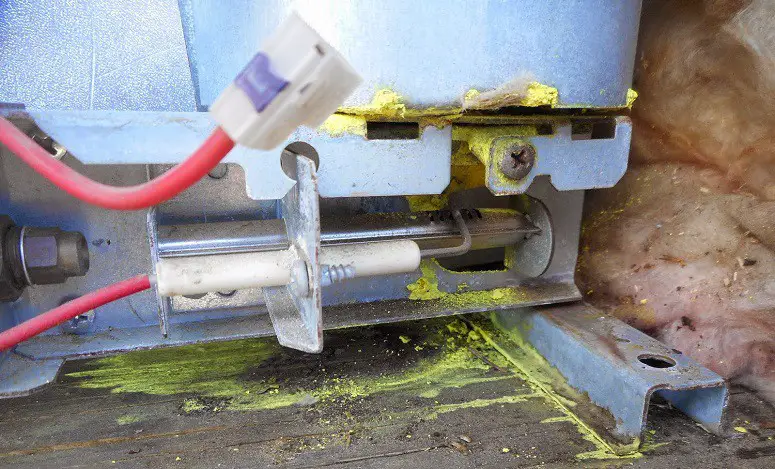
If the cooling unit is leaking, you’ll know pretty quickly: you’ll smell the ammonia immediately.
Step 1
Turn off your refrigerator’s power. You won’t be creating any new problems—your leaky refrigerator won’t be able to keep cool anyway.
Step 2
Access your refrigerator’s cooling unit. If everything looks normal, you might be able to salvage the unit.
If you see yellow everywhere, your cooling unit might be done for. The yellow residue is the result of the ammonia wearing down the steel tubing.
Step 3
Contain the leak to stop ammonia from spreading. Your fridge is out of order until you replace your cooling unit.
Replacing the cooling unit in your camper refrigerator is a big job. You can watch this video to see how it’s done:
Alternatively, you can call in the professionals. This might be expensive, but it’s better not to mess around when it comes to the cooling unit.
How To Fix A Camper Refrigerator With A Frozen Cooling Unit
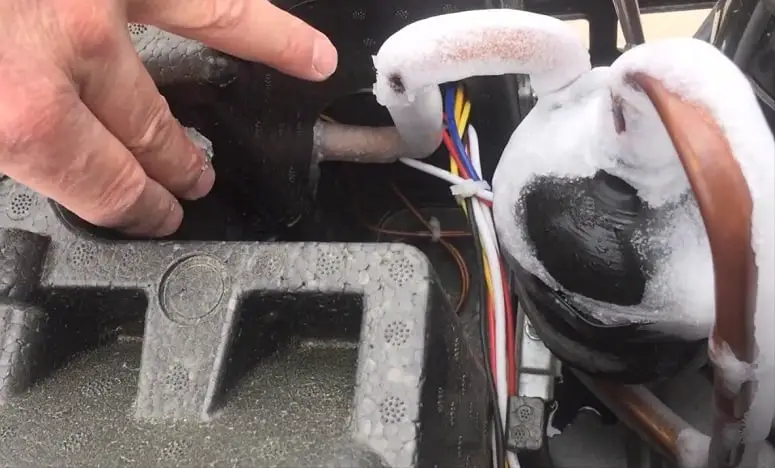
A frozen cooling unit might not sound like a problem at first.
When it comes to your refrigerator, the colder the better, right?
Well, remember what’s in your cooling unit—the cooling solution. If this is frozen solid, it can’t circulate throughout your refrigerator. The end result is a warm fridge.
A frozen unit can happen in extreme conditions. If the temperature drops well below freezing, this can happen.
If your RV has been sitting outside in the freezing cold overnight, this might be why your fridge isn’t working. Run the heat inside and wait for the unit to defrost.
After several hours, check to see if your fridge works. If it doesn’t, another issue may be at hand.
How To Fix A Camper Refrigerator That’s Leaking Water
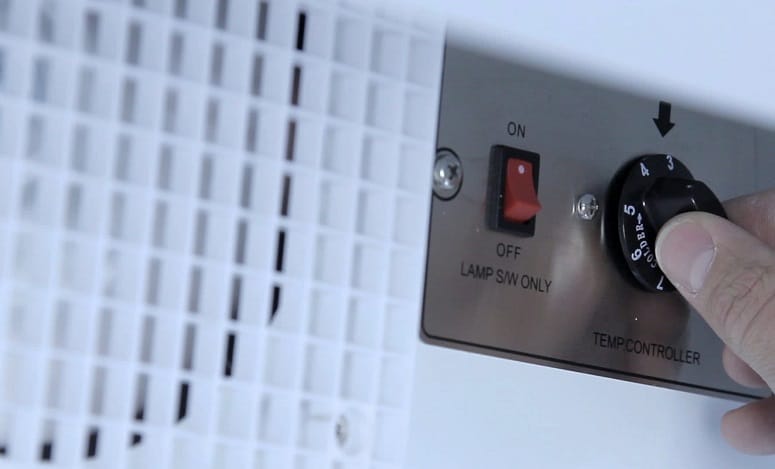
Water leaking from your camper refrigerator can be a nuisance, and it can also be dangerous. Not only do you have to clean it up regularly, but someone can slip and fall.
Step 1
Try changing your fridge’s temperature settings. If the temperature is too high, moisture can accumulate.
If your refrigerator has a “dry” setting, make use of it. This can help to avoid humidity — and leaks.
Step 2
Your refrigerator might have to be defrosted. If there’s a big chunk of ice blocking up the fridge, this could be the source of the leak.
Step 3
If you’re still finding water, check your refrigerator’s drainage hose. You can access it through the back of the fridge.
If the drainage hose is damaged or blocked, water will collect inside your trailer. You can either replace it or try a DIY fix.
Maintaining Your Camper Refrigerator
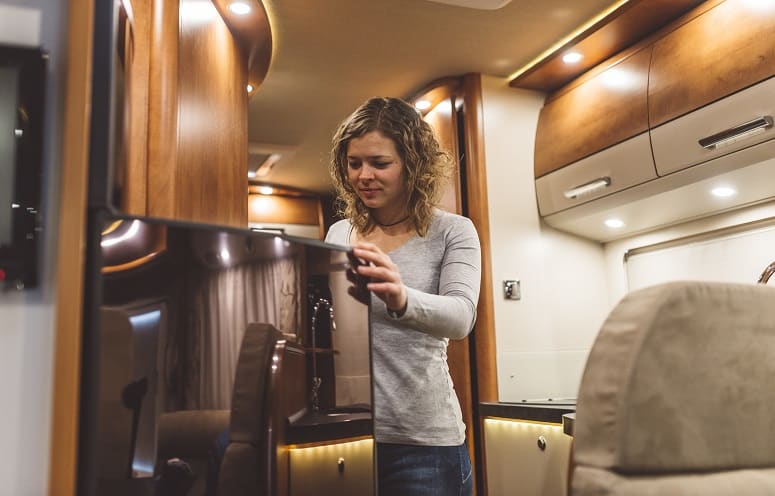
As with other RV appliances, you shouldn’t neglect regular refrigerator maintenance. Keeping a few good habits in mind will go a long way towards preventing breakdowns.
Use The Right Power Source
There are times when you should pick electricity over propane. For example, if you’re camping at high altitudes.
It’s generally better to use electricity rather than propane if you’re up high. There is less oxygen, so liquid gas will not burn as it does at lower elevations.
It isn’t only a matter of wasting propane. Your refrigerator burners could burn out, requiring potentially expensive repair.
Keep It Clean
Don’t forget the exterior when you’re cleaning out the refrigerator. Dirt accumulating on the burners or in the drainage pipe can cause issues.
Always clean your refrigerator thoroughly before your camper goes into storage.
Consider it an obligatory maintenance task.
Conclusion
A broken refrigerator can spoil your food, and ruin an otherwise wonderful trip. As you can see, there are many fixes you can try safely by yourself.
In any case, don’t let potential issues with your RV fridge deter you from RVing. Most RV refrigerators are very sturdy and designed specifically to be used on the road. The chances of them breaking down are low, indeed—and here you’ve got some DIY tricks up your sleeve when this does happen.
If you have other RV fridge repair tricks, please tell us. We want to hear all about them in the comments.
Did this article help you with your camper refrigerator? Share the knowledge with other RVing enthusiasts.


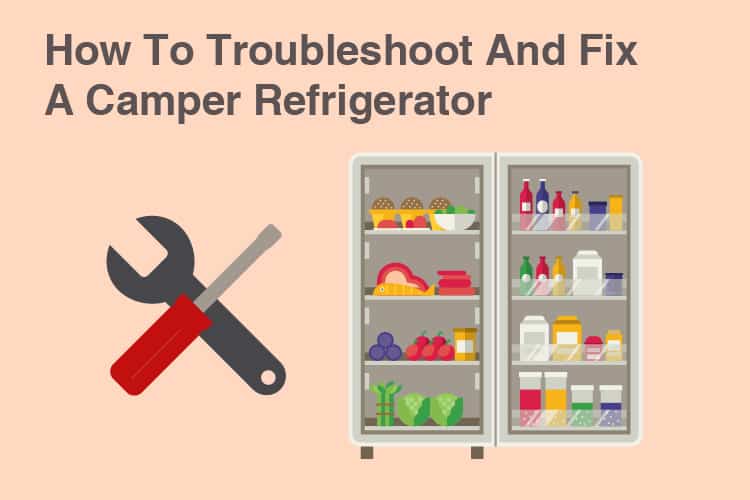
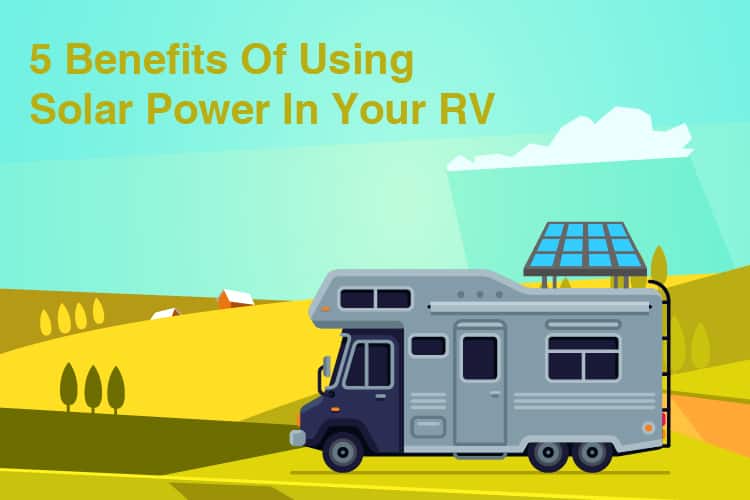
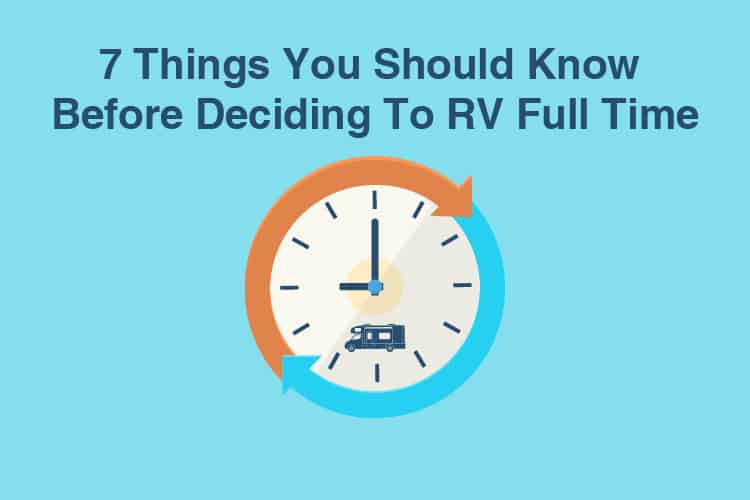


does my frige have high or low presser popane gas
It’s great! Here is information that I need. I’m needing check the ammoniac level in my RV fridge. Thank you so much!
Some information that I found also related to it. What do you think about it?
https://vogeltalksrving.com/how-to-check-the-ammonia-level-in-rv-fridge/
My temperature setting lights keep blinking and the refrigerator shuts off after about a minute both on gas and electric
My refrigerator green light was flashing so I put it in auto and then it quit cooling all together what do I do